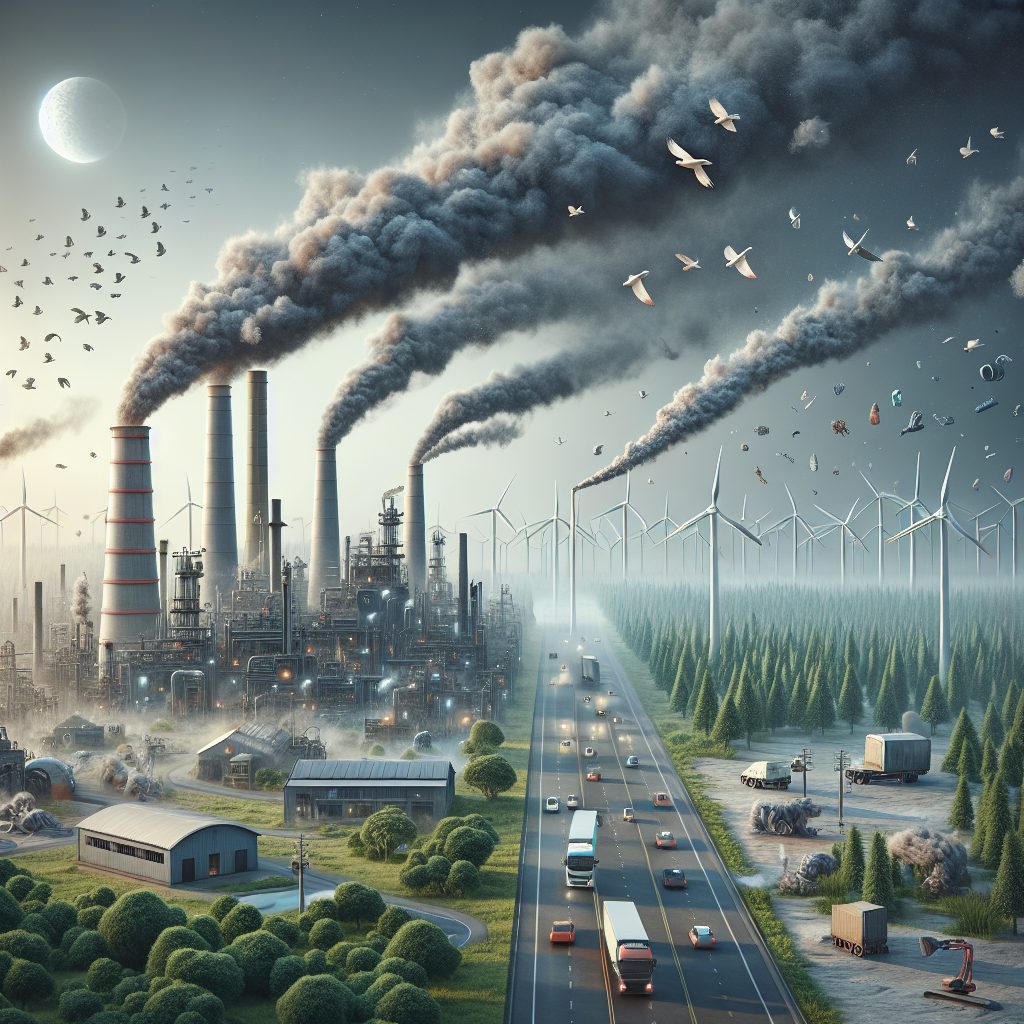
Humans have been able to significantly influence the atmosphere due to population growth and activity. As human population has increased over time, so have the emissions of gases that trap heat on Earth. The warming caused by these emissions has been referred to as the human influence on atmosphere, commonly known as the greenhouse effect.
The human influence on atmosphere has had remarkable effects on global temperatures. Average global temperatures have been on the rise over the last century, and this rise has been linked to a steady increase in greenhouse gases as they accumulate in the atmosphere. This has also caused changes to weather patterns, sea levels, and the natural resources we depend on in our everyday lives. Further, the effects of the human influence on atmosphere are expected to continue, potentially with more extreme weather such a droughts or heatwaves. The key takeaways from this article will be a brief discussion of the current research on the human influence on atmosphere, and strategies and policies we can adopt in order to reduce the effects of the greenhouse effect.
Key Takeaways
1. Human activities have a direct influence on the atmosphere, including the introduction of pollutants, the burning of fossil fuels, urban development, and the emission of greenhouse gases.
2. The burning of fossil fuels is the leading cause of atmospheric pollution, with emissions created from burning coal, natural gas, oil, and biomass contributing to a wide range of environmental threats including global warming and smog.
3. The effects of climate change can be seen worldwide, as increased temperatures caused by the emission of greenhouse gases are leading to melting ice caps, rising sea levels, and extreme weather patterns.
4. Urban sprawl is another human activity that contributes to the degradation of the atmosphere, as cities expand their footprints, environmental systems become disrupted, and air and water quality are impacted.
5. To combat the effects of human-caused atmospheric pollution, steps must be taken to reduce emissions from fossil fuels, reduce urban development, and move towards a more sustainably powered future.
What is the Impact of Human Activity on the Atmosphere?
Human-Induced Pollutants and Emissions
Humans are rapidly adapting and evolving despite the repercussion on the environment. The root cause of the damaging impact of climate change on the atmosphere is due to human overconsumption and improper disposal of pollutants. The earth’s oceans and air are increasingly inundated with air, water, soil, and land pollutants including chemicals, litter, and oil spills. Human emissions of nitrogen, sulfur, and carbon primarily come from the burning of non-renewable natural resources such as oil and coal. These pollutants occur from the fuel burned in aircrafts, factories, and automobiles. In recent years, the carbon dioxide claim rates have increased by about 37% since 1970 due to deforestation and industrial and agricultural activities on land that produce the greenhouse gases commonly associated with global warming.
Impacts on Weather Patterns and Ozone Layer
The depletion of the Ozone layer is caused by human activities such Chlorofluorocarbons (CFC) released from aerosol sprays, refrigerants and air conditioners. The consequences of ozone layer depletion lead to abnormal warming of the stratosphere with its resulting climate change. This climate change is linked to extreme weather events such as floods, droughts, and snowstorms. Furthermore, acid rain is another form of environmental destruction caused by the overuse of fossil fuels by humans. The sulfur released by burning coal and other fossil fuels reacts with the atmosphere and forms acidic substances that hurt the environment.
Greenhouse Gases
Greenhouse gases create a layer in the atmosphere that helps to trap some of the sunlight, keeping the planet from becoming too hot or cold. Carbon dioxide, methane, nitrous oxide, and other radiative gases found in the atmosphere are naturally occurring components of the environment. However, the burning of fossil fuels and other human activity have raised the concentrations of these and other gases significantly since the 1950s. This affects the Earth’s energy balance and leads to a warming of the planet.
Water Vapor
The water vapor in the atmosphere acts similarly to greenhouse gases by trapping heat in the atmosphere. The more water vapor there is in the atmosphere, the higher the global temperature. As average air temperatures have risen, additional water vapor has been released from the oceans, lakes, and rivers, leading to an even greater increase in temperatures.
Land-Use Change and Deforestation
The destruction of forests, wetlands, and other types of vegetation has drastically reduced the amount of carbon dioxide absorbed by these plants and transferred to the atmosphere. The burning of plant matter produces additional amounts of carbon dioxide. Furthermore, deforestation disrupts the natural water cycle, leading to decreased soil fertility, water shortages, and air pollution.
Top 5 Tips to Reduce Human Influence on Atmosphere
1. Reduce the consumption of fossil fuels and energy produced from them.
2. Reduce wasteful use and practice good conservation habits.
3. Plant more trees and take other steps to reduce deforestation.
4. Use energy efficient appliances.
5. Choose renewable energy sources such as solar power or wind power to reduce your carbon footprint.
What is Human Influence on Atmosphere?
Human influence on atmosphere is the result of activities we do that have an effect on the composition and temperature of the atmosphere. Everything from the burning of fossil fuels to deforestation, and more can change the composition of the atmosphere. This has had an enormously detrimental effect on the environment in recent years.
How Does Human Influence on Atmosphere Affect the Earth?
Human influence on atmosphere has had a serious effect on the earth’s climate. The burning of fossil fuels, especially coal, has increased levels of carbon dioxide in the atmosphere, contributing to global warming. This can lead to more extreme weather events, such as stronger storms, droughts, and flooding. Climate change can also threaten biodiversity, leading to changes in ecosystems and the extinction of certain species.
What Are the Effects of Human Influence on Atmosphere?
The effects of human influence on atmosphere are far reaching, and include, but are not limited to, those listed above. The melting of glaciers and polar ice caps is another major consequence, caused by rising temperatures, and this is leading to a steady rise in sea levels. Ocean acidification caused by carbon dioxide increasing the acidity of the oceans is also a concern, and this could have an effect on oceanic life.
What are the Main Causes of Human Influence on Atmosphere?
The main causes of human influence on atmosphere are burning of fossil fuels like coal and natural gas, deforestation, and pollution. The burning of these fuels emits large amounts of carbon dioxide and other pollutants, including sulfur dioxide and nitrous oxide, into the atmosphere, which contribute to global warming and climate change. Deforestation, the clearing of trees and other vegetation, decreases the amount of carbon stored in the environment.
What Can We Do to Reduce Human Influence on Atmosphere?
There are many ways in which we can reduce human influence on atmosphere. Reducing our reliance on fossil fuels and switching to clean energy sources such as solar and wind power can help to reduce emissions. Planting trees and restoring forests can also help to reduce carbon dioxide in the atmosphere. Additionally, cutting back on pollution, reducing waste, and recycling more can also have a positive effect on the environment.
What are Some Examples of Sustainable Practices to Reduce Human Influence on Atmosphere?
Some examples of sustainable practices to reduce human influence on atmosphere include using renewable energy sources, switching to organic farming, and using efficient transportation methods. Renewable energy sources such as solar, wind, and geothermal can substitute our reliance on fossil fuels and reduce emissions, while organic farming helps to maintain the fertility of soil and reduces the use of chemical fertilizers. Efficient transportation methods, like carpooling and cycling, can also help to reduce emissions.
Are There Any Technologies That Can Help Reduce Human Influence on Atmosphere?
Yes, there are technologies that can help reduce human influence on atmosphere. For example, carbon capture and storage technologies can be used to capture and store carbon emissions from power plants, effectively reducing levels of carbon dioxide. Additionally, cleaner burning fuels, such as biofuels, can reduce levels of air pollutants such as nitrogen oxide and sulfur dioxide.
Do We Know Enough to Understand Human Influence on Atmosphere?
Despite the large amount of research that has been done on Climate Change, there is still a lot of uncertainty surrounding it. Scientists can’t predict exactly how the climate will continue to change in coming years, which makes it difficult to plan for the future. It is clear, though, that human influence on atmosphere is a real factor that must be taken into consideration when planning for the future.
What Are The Long Term Effects of Human Influence on Atmosphere?
The long term effects of human influence on atmosphere are still largely unknown. However, it is likely that there will be disastrous consequences if the current trend of global warming continues. Rising sea levels, loss of species, and extreme weather events are just some of the potential long term effects that could come from continued human influence on atmosphere.
Final Thought
We must realize the gravity of the situation and take immediate action to reduce greenhouse gas emissions and protect the environment if we want to save our planet from future destruction. It’s clear that human influence on atmosphere has had a dramatic impact on the climate, and we must take steps now to reduce this impact and preserve the environment.
There are steps we can take to reduce our individual impact on the environment, such as conserving energy, switching to renewable energy sources, and reducing pollution. We must also work together on a global level to limit emissions and preserve the environment. Collective action is the key to ensuring a healthier planet for generations to come.



